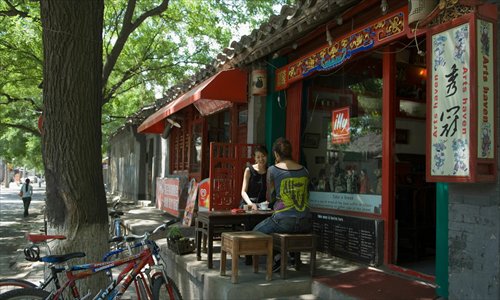
A small bar in one of Beijing's hutong. Photo: IC
At 11:09 pm on Friday, June 25, Jane Smith (pseudonym), a member of a more than 400-member Beijing-based expats' WeChat group, sent out a warning. "Police raid on Baochao. They're arbitrarily taking people to the station to do checks."
She added another post minutes later, "A posse of popos just came to Mado and demanded passports. Please watch out, two of my friends are at the station right now."
At least 10 patrons were arrested and given on-the-spot drug tests; six tested positive for marijuana, reported the International Business Times.
"The raids were done in a relatively professional manner," Smith said. It's also no coincidence that they came just a day before the International Day against Drug Abuse and Illicit Trafficking.
Summertime raids are nothing new to Beijing expats. This year the focus was on the hutong surrounding Baochao and Fangjia; bars like Mado and Modernista are often visited by police checking passports.
The raids and checks affect businesses in the area. If expats are worried they will be strong-armed by the police, they are not out spending all the extra yuan they have lying around.
A longtime business owner in Fangjia Hutong, who asked to remain anonymous, posted words of relief in the bar's WeChat event group a few days later, saying "Police checks are behind us; we're gonna party up on Fangjita tonight; you should join!"
He said the raids are detrimental to business, but the police do not care.
"To them, we are just an annoyance for the neighbors and foreigners pocketing Chinese money," he said. "They don't see the cultural side: [having] an attractive music and bar scene outside of Sanlitun."
A bar owner from Baochao, who also asked not to be named, said too much police presence could be the kiss of death for thriving bars.
"Two years ago, when the big raids happened at Temple and DaDa, we made sure we did not have anyone using drugs in our bar," he said. "Now our business is on a decline. We maybe only have a few good years left before they do everything they can to shut it down."
There has been speculation that this is due to an effort to "clean up" the hutong in Dongcheng district by shutting down unlicensed businesses and flushing out migrant workers.
In addition to raiding bars and an increased presence in the hutong, the police have started daily checks at Guanshuyuan (GSY), a compound mainly composed of foreigners in Dongcheng district.
James Barnard, an American, who has been in China since 2009, and lived in GSY since 2014, said it is deterring people from going out.
"People have been assessing which bars are likely to get raided and avoiding them for the time being," said Barnard. "As far as the paperwork, I just keep a high resolution picture on my phone."
The paperwork mentioned by Barnard refers to passports and housing registration papers, which now must be carried every day in the area as checks become more routine.
The raids affect tourists as well, and it does not matter where you took the drug.
Lang Li (pseudonym), a Chinese who lives in Beijing, said one of her friends from Italy was caught in a summer raid two years ago. "Even though she didn't take the drugs in Beijing, she was jailed and deported after testing positive," Lang said.
One of the six expats that tested positive for marijuana during the June 25 raid was deported immediately after his release from jail on July 3, a neighbor of the man, who also lives in the GSY expat community said. The man was the first foreigner to be convicted of illegal drug use in Beijing since the start of the summer raids.
